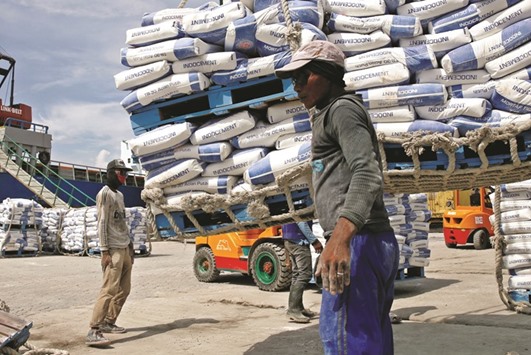Indonesia reported lower than expected growth in the first quarter, but many economists still expect enough of a rebound this year that the country can avoid further slowing and grow more than 5% in 2016.
The statistics bureau said yesterday that Southeast Asia’s largest economy expanded an annual 4.92% in the January-March quarter, below the median 5.05% in a Reuters poll and the October-December pace of 5.04%.
Growth weakened for the fifth straight year in 2015, to 4.8%, as poor commodity prices, contracting exports, tepid investment and waning consumption produced the lowest growth rate since 2009.
But the economy gained some momentum in the second half of last year as newly-appointed ministers accelerated government spending.
The statistics bureau took an optimistic tone.
“Our start in 2016 is better than the start of 2015,” said bureau head Suryamin. “Economic activity almost always slows in the first quarter, especially after growing higher in the fourth quarter.
In the first quarter of 2015, annual growth was 4.73%.
Bureau data showed consumption was stable in the first quarter and there was a rise in government-led investment from a year earlier. However, investment growth was weaker than in the December quarter.
The bureau said a major reason for slower growth was a drought worsened by the El Nino weather phenomenon, which hurt crop output.
Darmin Nasution, chief economics minister, said another reason was slowing loan growth. Euben Paracuelles, a Nomura economist in Singapore who had projected 5.4% first-quarter growth, said there was “some loss in growth momentum” as he had expected stronger public investment.
“This will raise the question of the sustainability of the recovery, but we would still argue that the recovery will continue, led by domestic demand,” he said. Tim Condon, ING’s Asia chief economist, said the lower growth pace in January-March than the previous quarter “is probably a one-off and the economy is in a sort of healing mode but obviously not a straight line path”.
Realising Indonesia cannot still rely on natural resources for growth, President Joko Widodo has worked to expand its weak manufacturing sector.
The Finance Ministry has offered tax incentives and promised a cut in corporate income taxes. It also plans a tax amnesty this year, which it believes will bring in significant funds to help finance development. The central bank cut its key benchmark rate three times in the first quarter, by a total of 75 basis points.
Also, Bank Indonesia has announced it will use a new benchmark in August, an effort to more effectively get banks to lower lending rates.
Some analysts expects more cuts to the benchmark. Rangga Cipta of Jakarta-based brokerage Samuel Sekuritas said the first quarter growth figure calls for a 50 basis point cut to the benchmark.
Widodo has pledged to get Indonesia’s growth up to 7% a year by 2019, the last year of his term. The government’s target for growth this year is 5.3%, while the central bank’s latest outlook was 5.2-5.6%.

Workers load sacks of cement into a ship at Sunda Kelapa harbour in Jakarta. The statistics bureau said yesterday that Indonesia’s economy expanded an annual 4.92% in the January-March quarter, below the median 5.05% in a Reuters poll and the October-December pace of 5.04%.
